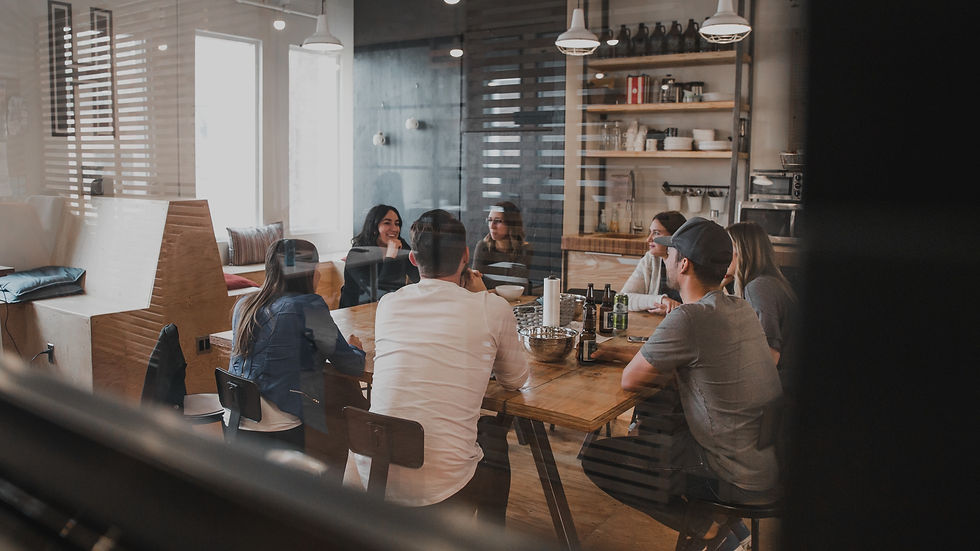Conseils pour soutenir la santé et la performance des employés dans le cadre du COVID-19
- 20 mars 2020
- 4 min lire
Mise à jour : 8 janvier 2022

There have been two notable global pandemics in the last century. The first was the 1918 Spanish Flue (H1N1) and the swine flu (also an H1N1 strain) in 2008. In 1918, the Spanish flue was first identified in military personnel and affected one-third of the global population and killed an estimated of 20-50 million people. Like today, schools and businesses were closed, which led to a tremendous impact on the economy and people’s livelihoods, health and well-being. While the 1918 global pandemic was the most devastating, many of those that pulled through, came out stronger. And, the worlds’ authorities, such as the Centre for Disease Control and Prevention and World Health Organization, have learned better ways to stop the spread. Yes, today’s situation is different: our health care system capabilities are different, business is different, the virus is different, and the economic hit is different. However, we have, and we will, pull through once again. Sometimes a little help is all that is needed.
As employer’s, HR professionals or workplace wellness practitioners, the most important thing we can do is to support each other’s physical and mental well-being so that we can not only pull through, but keep the wheels turning to reduce the impact on the well-being of business. People are afraid. People feel isolated. When we are living in a state of anxiety, our higher cognitive functioning doesn’t work as well. Our ability to see the big picture fades away. It is now more important than ever to support well-being. Our minds and bodies are inextricably intertwined, so let’s take care of each other.
Voici quelques conseils en matière de santé et de performance pour soutenir notre plus grand atout, notre personnel.
Soutien aux travailleurs à distance
If employees are working from home, make sure they are equipped with, or have a space at home, that is ergonomically appropriate. Providing employees with this checklist can help them get set up for success on their own. Remind them to keep the same routine. If they've got kids at home, keep all calls kid-friendly. We are all in this together!
Être attentif et promouvoir la pleine conscience
Everyone reacts to stress differently. Respect people’s differences. To help support everyone, provide people with mindfulness exercises to support overall mental well-being. Our resilience tip sheets have a few great tips you can share. Or, encourage staff to try one of the following.
Youtube meditation video
Favoriser les pauses fréquentes et l'air frais
Il est facile d'être très distrait à une époque où il y a des nouvelles de dernière minute sur l'évolution d'un nouveau virus qui a un impact sur la vie des gens, leur bien-être et l'économie. Encouragez les pauses fréquentes qui offrent une distraction positive. Envoyez régulièrement une invitation dans votre calendrier pour vous rappeler amicalement de faire une pause. Incluez quelques suggestions dans les notes. Par exemple, encouragez les gens à s'emmitoufler et à faire une promenade, à faire de l'exercice, à boire du thé, à faire un puzzle, à méditer ou à se rapprocher d'un être cher. Encouragez les pauses qui offrent une distraction positive et incitez les gens à prendre un peu d'air frais.
Promouvoir l'activité physique
Lorsque les gens sont cloîtrés chez eux, sans accès à une salle de sport, il peut sembler qu'il y ait peu d'options pour rester actif. Pour l'instant, YouTube est votre ami. Il existe des tonnes de vidéos que toute la famille peut apprécier. Voici quelques idées gratuites, mais n'oubliez pas que les possibilités sont vraiment infinies.
Lien social
We are physically disconnected from colleagues and sometimes our loved ones, but we can still stay in touch. Connect with remote works frequently, even a 10-minute video touch base every other day can do wonders to help with engagement and morale. If you are unfamiliar with video calls, try Microsoft team, Zoom (free for one-on-one calls and groups calls under 40 minutes), Skype (free when using internet only), Facetime or What’s app (phone only), or any other platform you are familiar with. If you don’t use video calls, a friendly voice can help too. Read more on this topic.
Nutrition
There is a link between mental health and diet. And, as a Harvard article points out, like an expensive car, your brain functions best when it gets only premium fuel. The results of a recent study also showed the risk of depression was 25 to 35 per cent lower in people who ate the Mediterranean or Japanese diet vs a diet high in vegetables, fruits, seafood, unprocessed grains and a little amounts of lean meats and dairy, processed and refined foods. Now that many have more time to cook, create a sense of community by featuring an employee recipe once a week, or heck, even once a day! Read more on this topic.
Hygiène des mains
If employee are still working on-site, post hand washing posters to encourage good hand hygiene. And of course, make sure to sterilize high touch areas after every new contact.
There are many ways to support employees who are working remotely, or in a stressful situation. Please visit our resources page with resilience tip sheets, breathing exercises, mental health resource handouts and more available to download.
If you are looking for more formal support, we also offering interactive online resilience, well-being and productivity training.
N'oubliez pas, nous allons nous en sortir. Les défis d'aujourd'hui seront les forces de demain.
![wwc-logo-transparent-png.png[80].png](https://static.wixstatic.com/media/6884e0_850f8b03110649f2892fc04639a82ea1~mv2.png/v1/fill/w_104,h_69,al_c,q_85,usm_0.66_1.00_0.01,enc_avif,quality_auto/wwc-logo-transparent-png_png%5B80%5D.png)



Commentaires